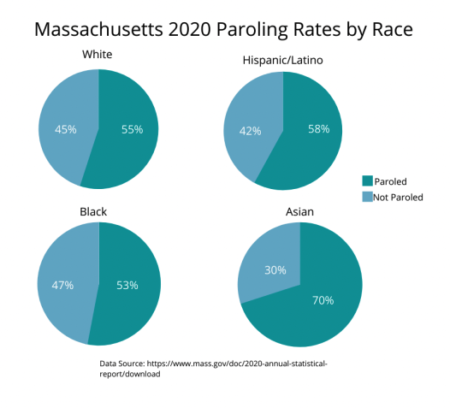
“People of color are more likely to serve longer sentences, even after accounting for criminal history, demographics, initial charge severity, court jurisdiction, and neighborhood characteristics.”
A special commission formed to study structural racism in the Massachusetts parole process found that people of color are over-represented and disproportionately affected by the criminal legal system in the Commonwealth. The Commission on Structural Racism in MA Parole Process released 16 recommendations in its December 2021 Final Report.
 In 2020, when state lawmakers passed the somewhat controversial omnibus police reform act, the legislation formed a special committee on parole among a number of commissions. This one’s task: to study structural racism and report on ways to improve equity in the Mass parole process. Appointed co-chairs were Rep. Andy X. Vargas and Sen. Jamie Eldridge, with 11 commissioners, also appointed, as designated by statute.
In 2020, when state lawmakers passed the somewhat controversial omnibus police reform act, the legislation formed a special committee on parole among a number of commissions. This one’s task: to study structural racism and report on ways to improve equity in the Mass parole process. Appointed co-chairs were Rep. Andy X. Vargas and Sen. Jamie Eldridge, with 11 commissioners, also appointed, as designated by statute.
Before Mass gets to see if new ideas turn into practice, the commission determined that the Parole Board is seriously lacking in five important areas: rethinking conditions of parole; diversity of its organizational culture; removing financial barriers for those on parole; improving what they call “protocols and processes;” and improving the body’s shocking lack of transparency, which we reported on last week. All of the commissioners except Colette Santa, the only member of the current Parole Board on the commission, voted to approve the report.
The 16 recommendations are listed below, with one specifically aimed to correct the board’s lack of transparency. The commission recommends that all parole decisions, not just those for lifers, “must be recorded and securely stored, to be made available to the parolee, victim/survivor and their respective attorney(s) upon request.” Furthermore, “The recordings shall be stored and archived until the person is off parole or dies.” Monies should be allocated to that effect, they suggest.
Two of the most significant recommendations to improve racial equity would be served by passing An Act to Promote Equitable Access in Parole, which has not yet been voted out of the Joint Committee on Public Safety and Homeland Security. In that proposed legislation, language is similar to this guidance from the commission: 1) expand the Parole Board to nine members with at least three members who “have at least five years of experience in fields of psychiatry, psychology, social work, or the treatment of substance use disorder;” 2) add to the board, “at least one member who is a formerly incarcerated individual who has completed the parole process.” Currently six out of seven members come from law or law enforcement.
The 16 recommendations to eliminate policies and procedures that foster structural racism in parole are listed below, and since there is no enforcement mechanism, only time will tell if the Parole Board will take them up:
-
Identify a path towards phasing-out and/or eliminating [parole] supervision fees. It currently costs $80 a month to be on parole.
-
Eliminate the $25 Registry of Motor Vehicles (RMV) Mass ID fee for incarcerated individuals eligible for parole. The RMV, the Department of Correction (DOC), and the Sheriffs should establish a process to ensure that all incarcerated individuals have valid Mass IDs prior to being released on parole.
-
Allocate additional funding towards transitional housing and revocation diversion. People of color on parole have a distinct disadvantage, it has been found, in finding safe housing after incarceration.
-
Allocate an additional minimum of $1,000,000 annually towards housing to secure beds in sober housing programs that are certified with the Massachusetts Alliance for Sober Housing for individuals who cannot cover the costs themselves.
-
Establish a Mass. state tax incentive to match the federal Work Opportunity Tax Credit tax credit given to employers that hire [formerly incarcerated people], commonly referred to as CORI-friendly employer.
-
No condition of parole shall be ordered unless that condition specifically addresses the particular characteristics of the person and the offense for which they are being paroled. The Parole Board must consider whether any condition ordered would have a rehabilitative effect or serve a clear and legitimate public safety or rehabilitative purpose. The Parole Board must state the particular facts relative to each individual parolee that justify each condition of parole.
-
The Parole Board shall be expanded to 9 members and at all times the Board shall have at least three members each of whom have at least five years of experience in fields of psychiatry, psychology, social work, or the treatment of substance use disorder. One of those three members must be a licensed mental health professional as defined in section 1 of chapter 123 of the General Laws.
-
The Parole Board shall have at least one member who is a formerly incarcerated individual who has completed the parole process; a minimum of 3 years must have passed since the individual completed the parole process and they must have a background in at least one of the following areas: psychology, mental health and/or substance use, transitional housing, re-entry after incarceration, public safety, or law.
-
All members of the Parole Board, parole officers, and transitional service unit employees shall undergo annual cultural competency and implicit bias training, and structural racism education.
-
The Parole Board must establish a strategic plan to improve diversity of workforce personnel. The board is currently 18% non-white.
-
All parole decision hearing audio must be recorded and securely stored, to be made available to the parolee, victim/survivor and their respective attorney(s) upon request. The recordings shall be stored and archived until the person is off parole or dies. The Commission recommends additional funding to be allocated to the Parole Board in order to pay for implementation, recording and storage equipment, and personnel necessary to execute this request.
-
The Parole Board must collect and publish data (along with houses of correction and the DOC) on a number of statistics annually. Currently race/ethnicity data is missing in many areas.
-
At each parole hearing, a correctional program officer (CPO) or correctional facility staff member must be present and specifically inform the Parole Board of which services are available at a given time. The designee may weigh in on reserve restrictions.
-
The Parole Board should issue a detailed Record of Decision for all cases, including non-lifers, which includes individual details and facts about the case that have led the board to either approve or deny parole. In the case of denial, clear instructions should be provided to become a better candidate for parole.
-
Polygraph testing shall not be permitted as a condition for parole, unless research from accredited institutions deems them effective in predicting risk for a particular offense. The Parole Board shall review the latest peer reviewed research every 2 years.
-
The Parole Board must issue a determination on lifer cases no more than 90 days after the parole hearing. Currently, lifers wait anywhere from five to six months if the vote to parole is positive but close to nine months if it is negative.
This article is syndicated by the MassWire news service of the Boston Institute for Nonprofit Journalism. If you want to see more reporting like this, make a contribution at givetobinj.org. Donations will be matched by a national funder through November and December.
Jean Trounstine is a writer, activist, and professor whose latest book is Boy With a Knife: A Story of Murder, Remorse, and a Prisoner’s Fight for Justice. She is on the steering committee of the Coalition for Effective Public Safety.

